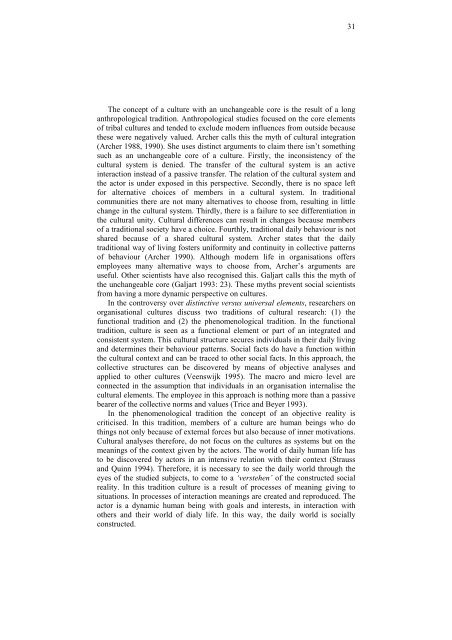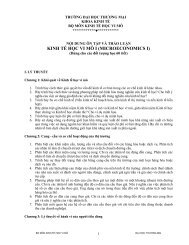The Internationalisation of PTT Telecom: A Cultural Perspective - Free
The Internationalisation of PTT Telecom: A Cultural Perspective - Free
The Internationalisation of PTT Telecom: A Cultural Perspective - Free
- No tags were found...
Create successful ePaper yourself
Turn your PDF publications into a flip-book with our unique Google optimized e-Paper software.
<strong>The</strong> concept <strong>of</strong> a culture with an unchangeable core is the result <strong>of</strong> a longanthropological tradition. Anthropological studies focused on the core elements<strong>of</strong> tribal cultures and tended to exclude modern influences from outside becausethese were negatively valued. Archer calls this the myth <strong>of</strong> cultural integration(Archer 1988, 1990). She uses distinct arguments to claim there isn’t somethingsuch as an unchangeable core <strong>of</strong> a culture. Firstly, the inconsistency <strong>of</strong> thecultural system is denied. <strong>The</strong> transfer <strong>of</strong> the cultural system is an activeinteraction instead <strong>of</strong> a passive transfer. <strong>The</strong> relation <strong>of</strong> the cultural system andthe actor is under exposed in this perspective. Secondly, there is no space leftfor alternative choices <strong>of</strong> members in a cultural system. In traditionalcommunities there are not many alternatives to choose from, resulting in littlechange in the cultural system. Thirdly, there is a failure to see differentiation inthe cultural unity. <strong>Cultural</strong> differences can result in changes because members<strong>of</strong> a traditional society have a choice. Fourthly, traditional daily behaviour is notshared because <strong>of</strong> a shared cultural system. Archer states that the dailytraditional way <strong>of</strong> living fosters uniformity and continuity in collective patterns<strong>of</strong> behaviour (Archer 1990). Although modern life in organisations <strong>of</strong>fersemployees many alternative ways to choose from, Archer’s arguments areuseful. Other scientists have also recognised this. Galjart calls this the myth <strong>of</strong>the unchangeable core (Galjart 1993: 23). <strong>The</strong>se myths prevent social scientistsfrom having a more dynamic perspective on cultures.In the controversy over distinctive versus universal elements, researchers onorganisational cultures discuss two traditions <strong>of</strong> cultural research: (1) thefunctional tradition and (2) the phenomenological tradition. In the functionaltradition, culture is seen as a functional element or part <strong>of</strong> an integrated andconsistent system. This cultural structure secures individuals in their daily livingand determines their behaviour patterns. Social facts do have a function withinthe cultural context and can be traced to other social facts. In this approach, thecollective structures can be discovered by means <strong>of</strong> objective analyses andapplied to other cultures (Veenswijk 1995). <strong>The</strong> macro and micro level areconnected in the assumption that individuals in an organisation internalise thecultural elements. <strong>The</strong> employee in this approach is nothing more than a passivebearer <strong>of</strong> the collective norms and values (Trice and Beyer 1993).In the phenomenological tradition the concept <strong>of</strong> an objective reality iscriticised. In this tradition, members <strong>of</strong> a culture are human beings who dothings not only because <strong>of</strong> external forces but also because <strong>of</strong> inner motivations.<strong>Cultural</strong> analyses therefore, do not focus on the cultures as systems but on themeanings <strong>of</strong> the context given by the actors. <strong>The</strong> world <strong>of</strong> daily human life hasto be discovered by actors in an intensive relation with their context (Straussand Quinn 1994). <strong>The</strong>refore, it is necessary to see the daily world through theeyes <strong>of</strong> the studied subjects, to come to a ‘verstehen’ <strong>of</strong> the constructed socialreality. In this tradition culture is a result <strong>of</strong> processes <strong>of</strong> meaning giving tosituations. In processes <strong>of</strong> interaction meanings are created and reproduced. <strong>The</strong>actor is a dynamic human being with goals and interests, in interaction withothers and their world <strong>of</strong> dialy life. In this way, the daily world is sociallyconstructed.31




